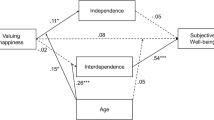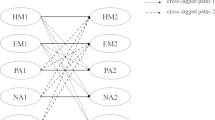Abstract
The intense desire to achieve happiness is linked to increased well-being in collectivist societies. However, research showed that the emotional payback of valuing happiness only applies to older adults but not to younger undergraduate students. Existing studies on how valuing happiness predicts well-being in different populations use cross-sectional designs, offering limited evidence on the temporal precedence between valuing happiness and wellbeing outcomes. Hence, this study examined the association between valuing happiness and positive affect among Filipino adolescents via a three-wave cross-lagged panel design. Results of cross-lagged panel structural equation modeling demonstrated that valuing happiness was positively associated with subsequent positive affect even after controlling for auto-regressor effects. The results are discussed in terms of the implications of valuing happiness among adolescents.

Similar content being viewed by others

Data Availability
The data that support the findings of this study are available from the corresponding author upon reasonable request.
References
Anderson, J. C., & Gerbing, D. W. (1988). Structural equation modeling in practice: A review and recommended two-step approach. Psychological Bulletin, 103, 411–423.
Arnett, J. J. (1999). Adolescent storm and stress, reconsidered. American Psychologist, 54, 317–326.
Bernardo, A. B. I. (2008). Individual and social dimensions of Filipino students’ achievement goals. International Journal of Psychology, 43, 886–891. https://doi.org/10.1080/00207590701837834.
Bernardo, A. B. I. (2019). Sociocultural dimensions of student motivation: Research approaches and insights from the Philippines. In G. A. D. Liem & S. H. Tan (Eds.), Asian education miracles: In search of sociocultural and psychological explanations (pp. 139–154). Routledge.
Bernardo, A. B. I., Salanga, M. G. C., Khan, A., & Yeung, S. S. (2016). Internal and external loci-of-hope predict use of individual and collaborative learning strategies: Evidence from university learners in four Asian cities. The Asia-Pacific Education Researcher, 25, 367–376. https://doi.org/10.1007/s40299-015-0249-y.
Bernardo, A. B. I., Yeung, S. S., Resurreccion, K. F., Resurreccion, R. R., & Khan, A. (2018). External locus-of-hope, well-being, and coping of students: A cross-cultural investigation within Asia. Psychology in the Schools, 55, 908–923. https://doi.org/10.1002/pits.22155.
Catalino, L. I., Algoe, S. B., & Fredrickson, B. L. (2014). Prioritizing positivity: An effective approach to pursuing happiness? Emotion, 14, 1155–1161. https://doi.org/10.1037/a0038029.
Datu, J. A. D., & Lizada, G. S. N. (2018). Interdependent happiness is associated with higher levels of behavioral and emotional engagement among Filipino university students. Philippine Journal of Psychology, 51(1), 63–80. https://doi.org/10.31710/pjp/0051.01.04.
Datu, J. A. D., & Mateo, N. J. (2020). Character strengths, academic self-efficacy, and well-being outcomes among Filipino high school students: A longitudinal study. Children and Youth Services Review. Advance online publication. https://doi.org/10.1016/j.childyouth.2020.105649.
Datu, J. A. D., King, R. B., & Valdez, J. P. M. (2016). The benefits of socially-oriented happiness: Validation of the interdependent happiness scale in the Philippines. Child Indicators Research, 9(3), 631–649. https://doi.org/10.1007/s12187-015-9333-3.
Datu, J. A. D., King, R. B., & Valdez, J. P. M. (2017). The academic rewards of socially-oriented happiness: Interdependent happiness promotes academic engagement. Journal of School Psychology, 61, 19–31. https://doi.org/10.1016/j.jsp.2016.12.004.
Diener, E., Kanazawa, S., Suh, E. M., & Oishi, S. (2015). Why people are in a generally good mood. Personality and Social Psychology Review, 19, 235–256. https://doi.org/10.1177/1088868314544467.
Erikson, E. H. (1968). Identity, youth and crisis. Norton.
Erikson, E. H. (1994). Identity: Youth and crisis. Norton.
Ford, B. Q., Shallcross, A. J., Mauss, I. B., Floerke, V. A., & Gruber, J. (2014). If you seek it, it won’t come: Valuing happiness is associated with symptoms and diagnosis of depression. Journal of Social and Clinical Psychology, 93, 891–906. https://doi.org/10.1521/jscp.2014.33.10.890.
Ford, B. Q., Dmitrieva, J. O., Heller, D., Chentsova-Dutton, Y., Grossmann, I., Tamir, M., Uchida, Y., Koopmann-Holm, B., Floerke, V. A., Uhrig, M., Bokhan, T., & Mauss, I. B. (2015a). Culture shapes whether the pursuit of happiness predicts higher or lower well-being. Journal of Experimental Psychology: General, 44, 1053–1062. https://doi.org/10.1037/xge0000108.
Ford, B. Q., Mauss, I. B., & Gruber, J. (2015b). Valuing happiness is associated with bipolar disorder. Emotion, 15, 211–222. https://doi.org/10.1037/emo0000048.
Fredrickson, B. L. (2001). The role of positive emotions in positive psychology: The broaden-and-build theory of positive emotions. American Psychologist, 56, 218–226. https://doi.org/10.1037/0003-066X.56.3.218.
Fuligni, A. J. (2019). The need to contribute during adolescence. Perspectives on Psychological Science, 14, 331–343. https://doi.org/10.1177/1745691618805437.
Gentzler, A. L., Palmer, C. A., Ford, B. Q., Moran, K. M., & Mauss, I. B. (2019). Valuing happiness in youth: Associations with depressive symptoms and well-being. Journal of Applied Developmental Psychology., 62, 220–230. https://doi.org/10.1016/j.appdev.2019.03.001.
Gruber, J., Mauss, I. B., & Tamir, M. (2011). A dark side of happiness? How, when, and why happiness is not always good. Perspectives on Psychological Science, 6, 222–233. https://doi.org/10.1177/1745691611406927.
Hancock, G. R., & Mueller, R. O. (2001). Rethinking construct reliability within latent variable systems. In R. Cudeck, S. du Toit, & D. Soerbom (Eds.), Structural equation modeling: Present and future—A Festschrift in honor of Karl Jöreskog (pp. 195–216). Scientific Software International.
Hu, L. T., & Bentler, P. M. (1999). Cut-off criteria for fit indexes in covariance structure analysis: Conventional criteria versus new alternatives. Structural Equation Modeling, 6, 1–55. https://doi.org/10.1080/10705519909540118.
King, R. B., & Datu, J. A. D. (2018). Grateful students are motivated, engaged, and successful in school: Cross-sectional, longitudinal, and experimental evidence. Journal of School Psychology, 70, 105–122. https://doi.org/10.1016/j.jsp.2018.08.001.
Kuiper, R. M., & Ryan, O. (2018). Drawing conclusions from cross-lagged relationships: Re-considering the role of the time-interval. Structural Equation Modeling, 25(4), 809–823. https://doi.org/10.1080/10705511.2018.1431046.
Lance, C., Butts, M., & Michels, L. (2006). The sources of four commonly reported cutoff criteria: What did they really say? Organizational Research Methods, 9, 202–220. https://doi.org/10.1177/1094428105284919.
Little, R. J. A. (1988). A test of missing completely at random for multivariate data with missing values. Journal of the American Statistical Association, 83, 1198–1202.
Little, T. D., Cunningham, W. A., Shahar, G., & Widaman, K. F. (2002). To parcel or not to parcel: Exploring the question weighing the merits. Structural Equation Modeling, 9, 151–173. https://doi.org/10.1207/S15328007SEM0902_1.
Marsh, H. W., & Yeung, A. S. (1998). Top-down, bottom up, and horizontal models: The direction of causality in multidimensional, hierarchical self-concept models. Journal of Personality and Social Psychology, 75, 509–527. https://doi.org/10.1037/0022-3514.75.2.509.
Mauss, I. B., Tamir, M., Anderson, C. L., & Savino, N. S. (2011). Can seeking happiness make people unhappy? Paradoxical effects of valuing happiness. Emotion, 11, 807–815. https://doi.org/10.1037/a0022010.
Mauss, I. B., Savino, N. S., Anderson, C. L., Weisbuch, M., Tamir, M., & Laudenslager, M. L. (2012). The pursuit of happiness can be lonely. Emotion, 12, 908–912. https://doi.org/10.1037/a0025299.
Suh, E. M., & Koo, J. (2011). A concise measure of subjective well-being (COMOSWB): Scale development and validation. Korean Journal of Social and Personality Psychology, 25, 96–114.
Tamir, M., & Millgram, Y. (2017). Motivated emotion regulation: Principles, lessons, and implications of a motivational analysis of emotion regulation. In A. J. Elliot (Ed.), Advances in motivation science (pp. 207–247).
Tkach, C., & Lyubomirsky, S. (2006). How do people pursue happiness? Relating personality, happiness-increasing strategies, and well-being. Journal of Happiness Studies, 7, 183–225. https://doi.org/10.1007/s10902-005-4754-1.
Uchida, Y., & Kitayama, S. (2009). Happiness and unhappiness in east and west: Themes and variations. Emotion, 9, 441–456. https://doi.org/10.1037/a0015634.
Uchida, Y., & Ogihara, Y. (2012). Personal or interpersonal construal of happiness: A cultural psychological perspective. International Journal of Wellbeing, 2(4), 354–369. https://doi.org/10.5502/ijw.v2.i4.5.
Uchida, Y., Norasakkunkit, V., & Kitayama, S. (2004). Cultural constructions of happiness: Theory and empirical evidence. Journal of Happiness Studies, 5(3), 223–239. https://doi.org/10.1007/s10902-004-8785-9.
Wong, N., Gong, X., & Fung, H. H. (2019). Does valuing happiness enhance subjective wellbeing? The age-differential effect of interdependence. Journal of Happiness Studies. https://doi.org/10.1007/s10902-018-00068-5.
Author information
Authors and Affiliations
Corresponding author
Ethics declarations
Ethical Approval
All procedures performed in studies involving human participants were in accordance with the ethical standards of the institutional and/or national research committee and with the 1964 Helsinki declaration and its later amendments or comparable ethical standards. Before submitting this manuscript, the first and corresponding author secured ethical clearance from the Human Research Ethics Committee of his university.
Informed Consent
Informed consent was obtained from all individual participants included in the study.
Conflict of Interest
There is no conflict of interest in this study.
Additional information
Publisher’s Note
Springer Nature remains neutral with regard to jurisdictional claims in published maps and institutional affiliations.
Preliminary results of this manuscript were disseminated by the first and third authors via a poster presentation in the 3rd Biennial International Conventions of Psychological Science in Paris, France.
Rights and permissions
About this article
Cite this article
Datu, J.A.D., Bernardo, A.B.I. & Valdez, J.P.M. The Emotional Rewards of Valuing Happiness: A Longitudinal Study Among Filipino Adolescents. Child Ind Res 14, 1769–1779 (2021). https://doi.org/10.1007/s12187-021-09820-5
Accepted:
Published:
Issue Date:
DOI: https://doi.org/10.1007/s12187-021-09820-5



